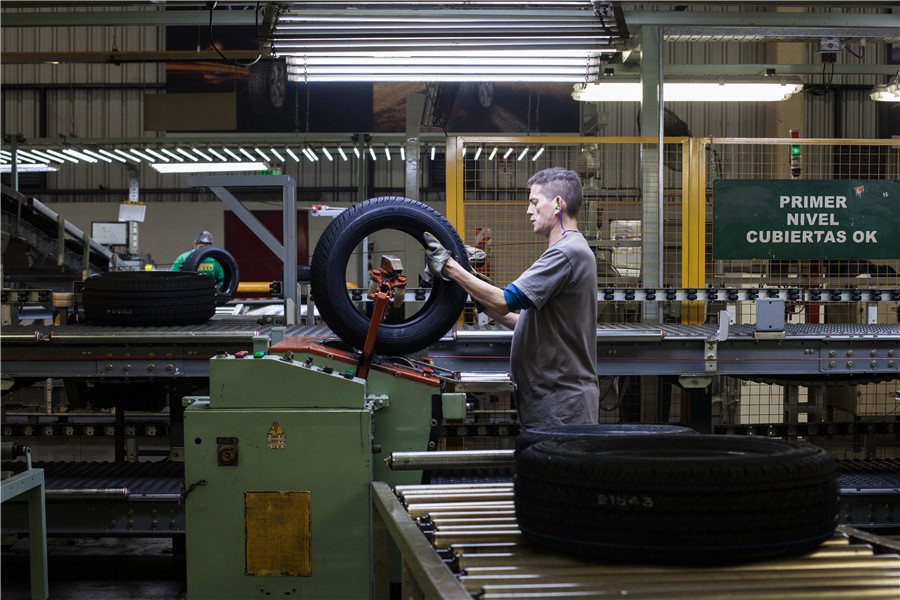Pirelli swears by expansion, tech to race on China roads

Italian tire maker looks at electric vehicle segment and smart plants for mainland edge
Pirelli, the Italian tire maker, hopes to turn China into one of its biggest markets by expanding its manufacturing capacity in the country, cultivating the retail network and supplying more tires for China's fast-growing electric vehicle sector.
The company expects its second plant in Yanzhou in East China's Shandong province to produce more high-performance tires with technical value such as noise-cancellation, run-flat and seal-inside function.
The plant is equipped with Industry 4.0 solutions, the current trend of automation and data exchange in manufacturing technologies.
The new plant, which Pirelli invested in 2018 and started operations at the beginning of this year, will give Pirelli the necessary production flexibility in the high-value segment, addressing the evolution of the Chinese market, the expected developments in electric vehicles and the growing share of homologations obtained in the original equipment segment in China, Japan and South Korea.
Giuliano Menassi, CEO of Pirelli APAC, said many opportunities also come from China, which is now the world's largest automobile market. Despite declining growth in the assembled car market, sales of high-end vehicles have continued to rise as Chinese consumers now expect more from their vehicles, said Menassi.
Supported by over 4,000 employees in China, the Milan-based company currently runs three factories in China and has a production capacity of 12 million pieces at the end of 2018.
It operates a commercial network of over 3,700 points of sale across the country. Its manufacturing facilities in China are also responsible for supplying tires to markets in the Asia-Pacific region.
The company is also building its APAC research and development center in Yanzhou to deploy the latest innovations and technologies.
"We have built many partnerships with automakers in the Asia-Pacific region," he said, adding these vehicle manufacturers increasingly have higher requirements of tires.
"From the beginning of the vehicle design, there will be a lot of requirements for the original equipment, especially in tire technology, which usually take between two years and three years to follow the vehicle model to develop together," he said.
"Under such circumstances, challenges and opportunities co-exist for us. We will know the trend of the market in advance, which gives us time to improve our tire technology to meet the market demand over the next two or three years."
Menassi said the company has already partnered domestic brands including Zhejiang Geely Holding Group, Nio Inc and Qiantu Motor. In addition to focusing on the high-end market, Pirelli is willing to work with China's new strength in automobile manufacturing and also keen to harness more potential from the country's fast-growing e-vehicle market.
Fitch Ratings predicted in a research note that China's e-vehicle market will continue to boom this year despite subsidy cuts, thanks to more attractive product offerings, wider commercial applications of passenger e-vehicles and the "pull-forward" effect.
"Today, road safety and environmental protection have become a trend in the Chinese society. Tires are playing a big role in this trend. A reliable high-quality tire can not only help save fuel, lower emissions and save money, but save lives," Menassi said.
Founded in 1872, Pirelli today operates 19 production plants in 12 countries and has a commercial presence in over 160 countries and regions.
Supported by 31,500 employees globally, Pirelli notched up sales revenue of 5.2 billion euros ($5.9 billion) in 2018. Among the world's major tire producers, it is the only player focused solely on the consumer tire market, which includes tires for cars, motorcycles and bicycles.
Zhao Ying, a researcher at the Institute of Industrial Economics, which is part of the Chinese Academy of Social Sciences in Beijing, said both China's new vehicle market and the used-car segment will see stable growth in the long term.
Although growth in China's auto market has been slowing, recent cuts in tariffs on imported vehicles and auto parts, and cuts in periodical repayment amounts of car loans, would help the market to grow in the long run, he said.
"Young consumers in China no longer use a car for long years until it is beyond repair. Rather, they tend to change cars to keep pace with the evolution of automobile technologies. They want to experience the newest features as and when they are launched," he said.
With personal wealth steadily growing and auto sales doing the same, the largest vehicle market in the world has attracted a number of foreign tire makers, he said.

